The global financial landscape is a complex web, intricately woven together by trade relationships that span continents. However, recent actions taken by former President Donald Trump, specifically the imposition of retaliatory tariffs, have sent shockwaves through the market, causing a downward spiral remarkably reminiscent of early pandemic fears. The iShares MSCI Emerging Markets ETF (EEM), a bellwether for countries that rely heavily on exports, is glaring testimony to the growing apprehension, poised for its greatest fall since June 2020. As it trades approximately 5% lower, stakeholders in emergent economies find themselves on a precarious precipice.
What many fail to recognize is how these tariffs disproportionately affect emerging markets that operate within a fragile economic framework. Countries such as South Korea, India, and China are not merely cogs in the wheel; they are often the backbone of global supply chains. Statistically, exports constitute an enormous share of their GDP—44% for South Korea, 21.8% for India, and 19.7% for China—casting a long shadow of vulnerability as tariffs take effect. These nations are paying the price in economic strangulation, forcing them to reconsider their role in an increasingly hostile global market.
The Irony of Global Supply Chains
Ironically, the very structure that has facilitated globalization—the integration of supply chains—now finds itself at the mercy of nationalistic policies. The Trump administration’s tariffs serve as a wake-up call, forcing nations that are heavily invested in exports to reassess their economic strategies. The top 10 holdings of the EEM, largely based in Taiwan, China, India, or South Korea, face an onslaught of tariffs ranging from 25% to a staggering 54%. Such glaring numbers highlight the increasingly dire situation these countries find themselves in.
As the burdens of tariff rates increase, countries are compelled to contemplate retaliatory measures, leading to a tit-for-tat scenario that could engender wider economic discord. China’s announcement of a 34% duty on U.S. imports in retaliation is just one example of how quickly the market can shift in this climate of insecurity. When trade barriers rise, so too does the probability of a global recession, creating an atmosphere of uncertainty that stifles growth and innovation.
The Distorted Winner’s Circle of Economic Isolationism
Economists like Torsten Slok from Apollo Global Management highlight a crucial disparity: while the U.S. stands to suffer but minimally in comparison, the ramifications on emerging markets might be catastrophic. The share of exports and imports as a percentage of GDP is considerably more significant for these countries. Many will find their economic aspirations dashed against the concrete realities of protectionist measures. This economic isolationism engenders fear, speculation, and a scramble for alternatives, often too late for those left at the mercy of dwindling trade opportunities.
Emerging markets are not simply passive victims; they are resilient players in the global arena. However, their struggles underline the precarious balance between interdependence and self-sufficiency. As tariffs grow and relationships sour, nations may find the once-charming allure of collaboration turning bitter, creating an environment where long-standing partnerships can dissolve in a matter of political whims.
Embracing the Uncertainty: Adaptation and Resilience
Amid this chaos, there lies a silver lining—the opportunity for adaptation and resilience. As emerging markets grapple with the consequences of a trade war, the pressing necessity for diversification becomes apparent. Countries can no longer afford to put all their eggs in one basket, reliant on a single market. Instead, exploring untapped opportunities, strengthening intra-regional trade frameworks, and developing self-reliant infrastructures should underpin their strategies moving forward.
While some may argue that retreating into isolationist policies is a prudent decision, the evidence suggests otherwise. There is an urgent need for emerging economies to champion their own trade agreements and foster new relationships. Historically, nations that adapt to challenges often emerge stronger, armed with lessons learned and pathways recalibrated.
More than ever, countries that once thrived on global interconnectedness must navigate the treacherous waters of protectionism with agility and foresight. The road is fraught with challenges, but the potential for significant recovery and growth exists for those courageous enough to confront the uncertainties head-on.

